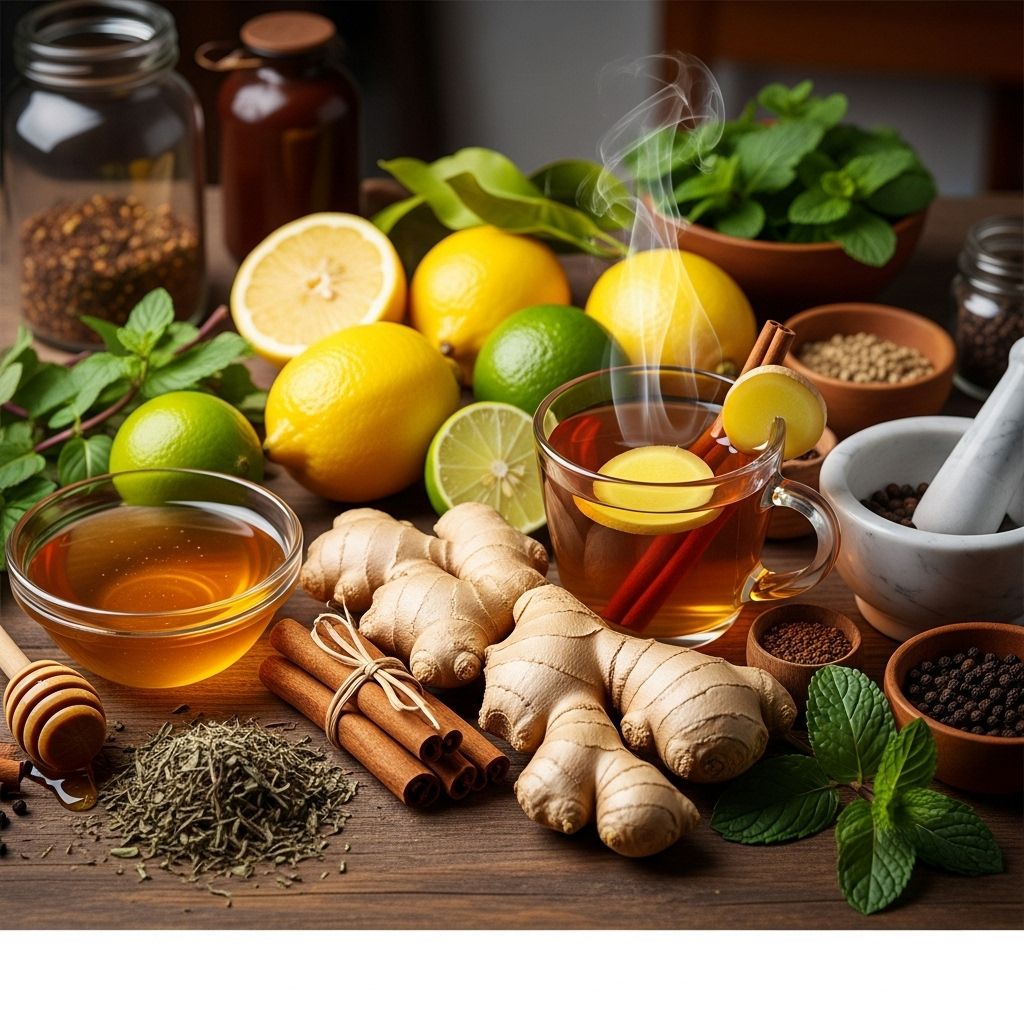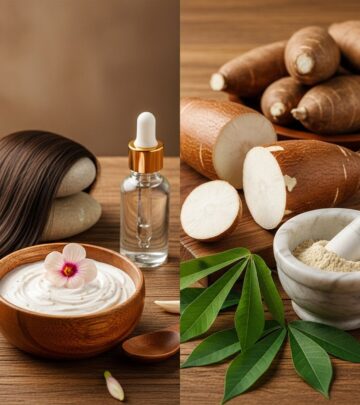Natural Ayurvedic Home Remedies for Common Cold
Discover ancient Ayurvedic wisdom to combat cold naturally with herbs & spices

The common cold is one of the most frequent ailments affecting people across all age groups, particularly during seasonal transitions and monsoons. While modern medicine offers quick fixes through antibiotics and over-the-counter medications, Ayurveda provides a holistic and natural approach to treating cold symptoms while strengthening the body’s inherent immunity. These time-tested remedies have been used for thousands of years and work in harmony with the body’s natural healing mechanisms.
Ayurveda views the common cold not merely as an infection but as an imbalance in the body’s doshas, particularly Kapha dosha, which governs mucus production and fluid balance. When Kapha becomes aggravated due to dietary indiscretions, seasonal changes, or weakened immunity, it manifests as symptoms like nasal congestion, runny nose, cough, and throat irritation. The Ayurvedic approach focuses on restoring this balance through natural ingredients readily available in most kitchens, making these remedies accessible, safe, and effective for everyone.
Understanding the Ayurvedic Perspective on Common Cold
According to Ayurvedic principles, health represents a perfect equilibrium among the three doshas—Vata, Pitta, and Kapha—which govern all physiological and psychological functions in the body. The common cold primarily involves an imbalance of Kapha dosha, characterized by heaviness, congestion, excess mucus production, and sluggishness. Sometimes, when fever accompanies cold symptoms, Pitta dosha aggravation may also be present, bringing heat and inflammation to the body.
The root cause of cold in Ayurveda is often attributed to the accumulation of ama, or toxins, in the body. Ama results from improper digestion and weak digestive fire (agni), creating a favorable environment for pathogens to thrive. Environmental factors such as cold weather, exposure to drafts, irregular eating habits, and consuming incompatible food combinations further contribute to dosha imbalance. Rather than simply suppressing symptoms, Ayurvedic remedies work to eliminate ama, restore digestive fire, balance doshas, and strengthen the body’s natural defense mechanisms.
This holistic approach explains why Ayurvedic remedies not only provide symptomatic relief but also prevent recurrence by addressing underlying imbalances. The emphasis on natural ingredients ensures that these treatments work gently without causing side effects, making them suitable for long-term use and prevention strategies.
Powerful Herbal Remedies from Your Kitchen
Ayurveda recognizes the medicinal properties of common kitchen ingredients, transforming everyday spices and herbs into powerful healing agents. These natural remedies have been validated through centuries of traditional use and are increasingly supported by modern scientific research.
Turmeric (Haldi): This golden spice stands as one of Ayurveda’s most valued medicinal herbs. Turmeric contains curcumin, a compound with potent anti-inflammatory, antibacterial, and antiviral properties that effectively combat cold-causing pathogens. When consumed with warm milk, turmeric helps expel phlegm from the respiratory tract while soothing throat irritation. The Western wellness community has embraced this remedy as “Golden Milk,” recognizing its immune-boosting capabilities. For best results, add one-quarter teaspoon of turmeric powder to a glass of warm milk, optionally including a pinch of black pepper to enhance curcumin absorption. Those seeking sweetness should use palm sugar or jaggery instead of refined sugar, as these natural sweeteners also possess throat-soothing properties.
Ginger (Adrak): Fresh ginger root serves as a powerful weapon against cold symptoms due to its warming nature and ability to reduce Kapha dosha. Ginger’s pungent compounds stimulate circulation, promote sweating to eliminate toxins, and provide significant anti-inflammatory effects that reduce sore throat pain. Scientific studies have demonstrated that consuming fresh ginger can reduce the severity and duration of cold symptoms. Ginger tea, prepared by simmering fresh ginger slices in water and adding lemon juice and honey, provides immediate relief for congestion and throat discomfort. The hot beverage soothes inflamed tissues while ginger’s active compounds work systemically to boost immune function.
Tulsi (Holy Basil): Revered in Ayurveda as the “Mother Medicine of Nature” and “Queen of Herbs,” Tulsi possesses remarkable immune-modulating properties. Research indicates that Tulsi leaves enhance the body’s production of antibodies, creating a stronger defense against respiratory infections. Its adaptogenic qualities help the body manage stress, which is crucial since stress weakens immunity. Tulsi’s expectorant properties facilitate the removal of sticky mucus from airways, providing relief from persistent cough. Chewing four to five fresh Tulsi leaves first thing in the morning establishes a protective shield against infections. Alternatively, brewing Tulsi kadha by boiling Tulsi leaves with ginger, peppercorns, and a touch of black salt creates a therapeutic beverage that addresses multiple cold symptoms simultaneously.
Cinnamon (Dalchini): This aromatic spice contributes warming properties that counteract the cold, damp qualities of Kapha imbalance. Cinnamon enhances circulation, supports digestive fire, and possesses antimicrobial properties that help fight infections. Adding a pinch of cinnamon powder to regular black tea or mixing it with honey creates an effective remedy for sore throat and congestion. The combination of cinnamon and honey is particularly powerful, as honey coats the throat while cinnamon’s volatile oils work to clear nasal passages.
Traditional Ayurvedic Preparations for Cold Relief
Beyond individual herbs, Ayurveda prescribes specific preparations that combine multiple ingredients to create synergistic healing effects. These traditional formulations have been refined over millennia to maximize therapeutic benefits.
Kadha or Kashayam: This concentrated herbal decoction represents one of Ayurveda’s most effective remedies for respiratory ailments. Kadha combines multiple herbs and spices in precise proportions to create a powerful healing beverage. The standard preparation involves boiling water with Tulsi leaves, turmeric powder, black pepper, and dry ginger (sonth) until the liquid reduces to half its original volume. This concentration process intensifies the medicinal properties of the ingredients. The kadha can be stored for one day but must be reheated before each consumption to maintain its therapeutic potency. For enhanced effectiveness and palatability, palm sugar or jaggery can be added as a natural sweetener that also soothes throat irritation.
Herbal Teas: Various Ayurvedic tea preparations target specific cold symptoms while nourishing the body. Masala chai, prepared with generous amounts of ginger, cardamom, cloves, and cinnamon, provides warmth and stimulates digestion while relieving congestion. The hot liquid soothes throat pain while the spices work to clear respiratory passages and boost immunity. For those preferring milder options, simple ginger-lemon tea with honey offers significant relief. The key is consuming these teas hot rather than warm or cold, as the heat helps flush out ama and supports the body’s natural healing processes.
Saltwater Gargle: Simple Yet Effective
Among the simplest yet most effective Ayurvedic remedies for sore throat and cold symptoms is the saltwater gargle. This ancient practice requires no special ingredients—just warm water and common salt—yet delivers remarkable results. The mechanism behind its effectiveness involves osmosis, where the salt solution draws excess fluid from swollen throat tissues, reducing inflammation and pain. Additionally, the gargle helps loosen and flush out mucus, bacteria, and irritants from the throat and tonsils.
To prepare an optimal gargling solution, dissolve one-half to one teaspoon of salt in a glass of warm (not hot) water. Gargle thoroughly for 30 seconds to one minute, ensuring the solution reaches the back of the throat where inflammation typically concentrates. Repeat this process three to four times daily, especially after meals and before bedtime. Unlike commercial antiseptic gargles that may contain harsh chemicals, saltwater provides gentle yet effective cleansing without disturbing the natural bacterial balance in the oral cavity.
Ayurvedic Remedies for Cold Allergies
Cold allergies, known in modern medicine as allergic rhinitis, present symptoms similar to common cold but stem from an exaggerated immune response to environmental triggers like pollen, dust, or temperature changes. Ayurveda recognizes this condition as a manifestation of weakened immunity combined with Kapha imbalance and provides specific remedies to address the root cause.
Amla (Indian Gooseberry): This superfruit ranks among Ayurveda’s most powerful immune modulators. Amla contains exceptionally high levels of vitamin C along with numerous bioactive compounds that regulate histamine release—the primary mediator of allergic reactions. Consuming one teaspoon of amla powder mixed with honey twice daily helps stabilize immune responses and reduces the frequency and severity of allergic episodes. Regular use of amla strengthens overall immunity, making the body less susceptible to allergens.
Licorice Root (Mulethi): Ayurvedic texts extensively document licorice root’s anti-allergic properties. This herb modulates immune function, soothes inflamed respiratory passages, and helps expel excess mucus. Consuming licorice root tea or powder in doses of approximately one gram daily provides significant relief from constant sneezing, watery eyes, and nasal congestion associated with cold allergies. The herb’s natural sweetness makes it pleasant to consume, though individuals with high blood pressure should use it cautiously and under professional guidance.
Kashaya Powder: Specialized Ayurvedic formulations in powder form combine multiple herbs to address allergic conditions comprehensively. These traditional preparations work systematically to reduce allergic sensitivity while strengthening respiratory health. Various kashaya powders are available through Ayurvedic pharmacies, each tailored for specific constitutional types and symptom patterns.
Dietary Recommendations During Cold
Ayurveda places tremendous emphasis on diet as medicine, particularly during illness. The right foods support healing while wrong choices can prolong or worsen symptoms. During cold, the digestive fire typically weakens, making it crucial to consume easily digestible, warm, and nourishing foods.
Foods to Favor: Light, warm, and freshly cooked meals should form the foundation of the diet during cold. Hot soups, particularly those made with vegetables, lentils, or bone broth, provide hydration and nutrients without taxing digestion. Khichdi, a traditional combination of rice and lentils cooked with digestive spices, serves as an ideal recuperative food. Herbal teas, warm water with honey and lemon, and fresh fruit juices (at room temperature) help maintain hydration while flushing out toxins. Spices like ginger, black pepper, turmeric, cumin, and coriander should be incorporated generously into meals for their immune-boosting and digestive properties.
Foods to Avoid: Cold, heavy, oily, and difficult-to-digest foods aggravate Kapha dosha and increase mucus production. Dairy products, particularly cold milk, yogurt, and cheese, should be avoided or minimized as they tend to increase congestion. Fried foods, refined sugars, processed items, and cold beverages burden the digestive system and create more ama. Raw vegetables and salads, despite being healthy otherwise, should be avoided during active cold symptoms as they are harder to digest and have cooling properties that counteract the body’s need for warmth.
Lifestyle Practices for Cold Management
Beyond herbs and diet, Ayurveda prescribes specific lifestyle modifications that support recovery and prevent recurrence of cold symptoms. These practices work synergistically with herbal remedies to create optimal healing conditions.
Steam Inhalation: Inhaling steam from hot water infused with eucalyptus oil, Tulsi leaves, or ajwain (carom seeds) provides immediate relief from nasal congestion. The warm, moist air loosens thick mucus, opens blocked nasal passages, and soothes irritated respiratory membranes. Perform steam inhalation two to three times daily by adding one to two drops of eucalyptus oil or a handful of Tulsi leaves to a bowl of hot water, creating a tent with a towel over your head, and breathing deeply for five to ten minutes.
Rest and Sleep: Adequate rest is non-negotiable during cold, as the body requires energy to fight infection and heal. Ayurveda recommends going to bed early and allowing the body sufficient sleep to restore balance. During rest, the body’s healing mechanisms function optimally, producing immune cells and repairing damaged tissues.
Hydration: Drinking plenty of hot water throughout the day serves multiple purposes in Ayurvedic cold management. Hot water stimulates digestion, flushes out ama, keeps respiratory passages moist, and supports the elimination of toxins through urine and sweat. The emphasis is specifically on hot water rather than room temperature or cold water, as heat enhances the cleansing effect. Aim to consume small amounts of hot water every 30 to 45 minutes while awake.
Hygiene Practices: Preventing the spread of infection and avoiding reinfection requires diligent hygiene. Wash hands thoroughly with soap and water for at least 20 seconds, especially before eating and after coughing or sneezing. Avoid touching the face, particularly the eyes, nose, and mouth, as these are entry points for pathogens. Sanitize frequently touched surfaces and maintain physical distance from others who are sick. Wearing a mask when in public spaces or around vulnerable individuals adds an extra layer of protection.
Immunity-Boosting Herbs for Prevention
Ayurveda emphasizes prevention as superior to cure, advocating regular use of immunity-enhancing herbs even when healthy. This proactive approach builds resilience against infections and reduces susceptibility to seasonal illnesses.
Giloy (Guduchi or Amrita): Known as the “divine nectar of immortality,” Giloy stands as one of Ayurveda’s most powerful immunomodulators. This herb possesses remarkable anti-inflammatory properties that reduce the frequency of respiratory infections while supporting overall immune function. Giloy helps manage cold symptoms caused by allergic reactions to pollution, smoke, or pollen. Taking two teaspoons of Giloy juice with warm water on an empty stomach in the morning or one Giloy tablet daily provides excellent preventive benefits. The herb is available in various forms through Ayurvedic pharmacies and online retailers.
Ashwagandha: This adaptogenic herb strengthens the body’s resilience to stress, which is crucial since chronic stress significantly weakens immune function. Ashwagandha supports healthy sleep patterns, balances energy levels, and enhances the body’s natural defense mechanisms. Regular supplementation during cold season can reduce the likelihood of falling ill.
Chyawanprash: This traditional Ayurvedic jam combines numerous herbs, primarily amla, in a honey and ghee base. Consuming one to two teaspoons of Chyawanprash daily, especially during winter and monsoon seasons, provides comprehensive immune support and protects against respiratory infections. The formulation is suitable for all ages and particularly beneficial for children and elderly individuals.
When to Seek Professional Help
While Ayurvedic home remedies effectively address most common cold cases, certain situations warrant professional medical attention. Understanding when self-care is insufficient ensures timely intervention for potentially serious conditions.
Consult a healthcare provider if cold symptoms persist beyond ten days without improvement, as this may indicate a secondary bacterial infection requiring different treatment. High fever exceeding 103°F (39.4°C), severe headache, chest pain, difficulty breathing, or persistent cough producing thick, colored mucus are warning signs that should not be ignored. Children, elderly individuals, pregnant women, and those with chronic health conditions should seek professional guidance earlier, as they are more vulnerable to complications.
Additionally, if you experience confusion, extreme fatigue, or symptoms that rapidly worsen, immediate medical evaluation is necessary. Ayurvedic remedies work best for uncomplicated common cold and as preventive measures, but they should complement rather than replace appropriate medical care when serious illness is suspected.
Frequently Asked Questions
Q: How quickly do Ayurvedic remedies work for cold symptoms?
A: Most people experience noticeable relief within 24 to 48 hours of starting Ayurvedic remedies, though complete recovery typically takes 5 to 7 days. The remedies work gently to support the body’s natural healing rather than simply suppressing symptoms, so patience is important. Consistent use of multiple remedies together often produces faster results than relying on a single approach.
Q: Can I take Ayurvedic remedies along with conventional cold medications?
A: Generally, most Ayurvedic home remedies are safe to use alongside conventional medications, as they consist of natural food-based ingredients. However, if you’re taking prescription medications or have underlying health conditions, consult with both your physician and an Ayurvedic practitioner to ensure there are no interactions. Simple remedies like ginger tea, turmeric milk, and saltwater gargle are typically safe for everyone.
Q: Are these remedies safe for children and pregnant women?
A: Many Ayurvedic remedies are safe for children and pregnant women when used appropriately, though dosages may need adjustment. Turmeric milk, ginger tea, honey (for children over one year), and saltwater gargle are generally safe. However, certain herbs like licorice and some concentrated preparations should be used cautiously. Pregnant women and parents of young children should consult with healthcare providers before starting any new remedy to ensure safety for their specific situation.
Q: How can I prevent getting colds in the first place?
A: Prevention in Ayurveda focuses on maintaining balanced doshas and strong immunity through regular practices. Consume immunity-boosting herbs like amla, Giloy, and Chyawanprash daily during cold season. Maintain a balanced diet with adequate spices and warm foods. Practice good hygiene, get sufficient sleep, manage stress through yoga or meditation, and avoid extreme weather exposure. Drinking hot water throughout the day and performing regular oil pulling (swishing oil in the mouth) also support immunity.
Q: What is the difference between Ayurvedic treatment and modern medicine for colds?
A: Modern medicine typically focuses on symptom suppression using decongestants, antihistamines, or antibiotics (for bacterial complications). Ayurveda takes a holistic approach, addressing root causes like dosha imbalance and ama accumulation while simultaneously relieving symptoms. Ayurvedic remedies work with the body’s natural healing mechanisms, strengthen immunity, and have minimal side effects. The choice between approaches depends on symptom severity, personal preference, and individual health status, though many people find that combining both systems provides optimal results.
Q: Can I use these remedies as a daily prevention even when healthy?
A: Absolutely! Many Ayurvedic remedies are designed for regular use to maintain health and prevent illness. Drinking herbal teas, consuming turmeric milk, chewing Tulsi leaves, and taking immunity-boosting herbs like Giloy can be incorporated into daily routines. These practices strengthen the body’s natural defenses and maintain dosha balance, making you less susceptible to infections. Seasonal adjustments in diet and lifestyle according to Ayurvedic principles provide year-round protection against common ailments.
The wisdom of Ayurveda offers time-tested, natural solutions for common cold that honor the body’s innate healing intelligence. By incorporating these remedies into your health routine, you not only address immediate symptoms but also build long-term resilience against illness. The beauty of Ayurvedic medicine lies in its accessibility—most remedies require only simple kitchen ingredients yet deliver profound healing benefits. Whether you’re currently battling a cold or seeking preventive strategies, these ancient practices provide safe, effective, and holistic support for optimal respiratory health and overall wellness.
Read full bio of Sneha Tete











